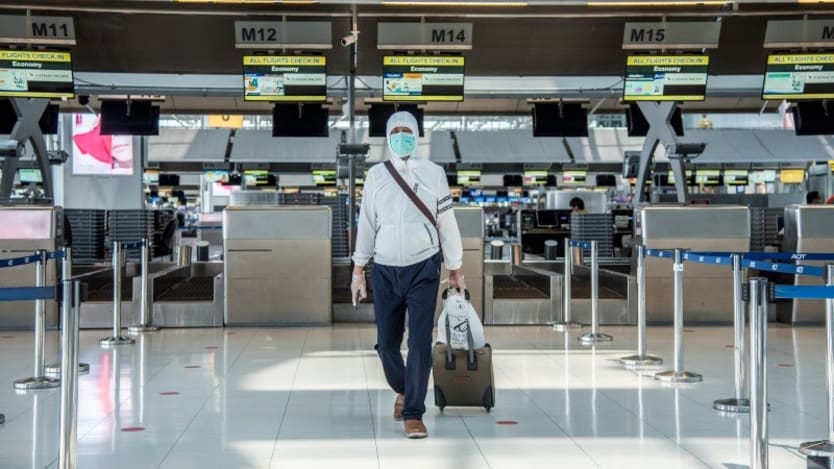
NEW YORK — Bismarck Swangin, chief of communications and advocacy for UNICEF in Yemen, deployed for his mission in March, planning to stay for a few weeks before returning home to Uganda.
But airport shutdowns and travel restrictions followed soon after Swangin’s arrival in Yemen, and he stayed there for five months. At first, his five young children asked regularly when their father would come home. After three months, they stopped asking.
“They realized I was not going to be able to come anytime soon, and they gave up. I simply kept telling them that in Uganda and in Yemen, the airports were closed and that when the airports are open, I will come,” Swangin told Devex. “It definitely takes a toll on you, and it takes a toll on the family as well. It is a sacrifice for staff members but also for family members.”
Travel restrictions during the coronavirus pandemic have shifted more responsibility to local aid workers, as many international aid workers remain grounded at home. But mandatory quarantines, visa restrictions, and commercial flight cancellations continue to complicate the job for those working outside their home country.
Isolated, anxious development pros embrace new methods under lockdown
Aid workers are finding unexpected silver linings during the pandemic.
In some cases, people are being tasked with additional responsibilities to make up for staffing gaps, experts say. And international aid workers based in what the United Nations considers hardship duty stations are no longer able to easily take off the standard rest and recuperation time from their work environments.
“What COVID has brought for everyone is uncertainty. That makes an already stressful industry even more stressful. I have heard of people rethinking whether this is a viable option for them anymore,” said Daniel Pugh, a former humanitarian worker who is now a wellness therapist for aid workers.
The stakes of being stationed in a conflict or crisis zone have become especially high for aid workers with spouses, children, or elderly relatives back home, Pugh said. He expects these new factors could hasten the industry’s demographic shift “to a younger person’s realm.”
“It used to be, if you were in Juba [in South Sudan] or in Goma [in Congo], you were getting R&R every four weeks and people went straight home to hang out with their spouses, their kids, their elderly mother. They won’t be able to pop back home like they could before. I expect to see a drop-off in the industry, and the age of the average worker will start to get younger,” Pugh said.
Rachael Cummings, head of the COVID-19 response for Save the Children’s emergency health unit in Cox’s Bazar, deployed to Bangladesh at the beginning of May. She arrived on a nearly empty plane that would soon turn around and repatriate aid workers who were already stationed in the country. It took two months for Cummings to receive a visa to enter the country, far longer than usual.
It has since been the longest deployment in recent years that Cummings can remember. Her typical mission would last three or four weeks, she told Devex, followed by a period of rest and recuperation. She is set to return to her home in London on Friday and, following a two-week quarantine, will reunite with her partner and young son.
“It was my son’s birthday yesterday. That is the longest I have been away from them since he was born. It wasn’t an issue, but it was a conversation in terms of ‘How are we going to make this work?’” Cummings said.
Save the Children asked Cummings and her colleagues to confirm they had no comorbidities or risk factors that could complicate their illness if they become sick with COVID-19 while in Bangladesh. Cummings was also told that medevac services might not be immediately available if she required hospitalization. Some colleagues who had high blood pressure or asthma, for example, did not get on the plane.
“There were people who just didn’t go, because the risks were too high,” Cummings said.
“What COVID has brought ... is uncertainty. That makes an already stressful industry even more stressful. I have heard of people rethinking whether this is a viable option for them anymore.”
— Daniel Pugh, wellness therapist for aid workersThis new reality of travel restrictions is unlikely to abate anytime soon, Cummings said. She called for investing more in local aid workers’ capacity, the lack of support for which has prompted criticism during the pandemic.
“I don’t see governments lifting travel restrictions, lockdowns — I don’t see that changing, and therefore we need to adapt to the new world,” Cummings said. “The opportunity is then to change that model and to ensure that capacity is maintained and built as close to a community as possible.”
Cummings added that “I think we need to acknowledge it is just not going to get back to what it was before.”
For some local aid workers, travel restrictions and the risk of contracting or transmitting COVID-19 have created new challenges in balancing their own professional and personal lives. Olfat Mahmoud, founder and director of the Palestinian Women’s Humanitarian Organization, leads coronavirus responses in refugee camps in Beirut. The day-to-day work of interacting with women across the camps could expose her to COVID-19.
“It is stressful. I want to see my aunt, but sometimes I say: ‘Oh my god, my aunt is old. Maybe I am carrying COVID-19 — how would I know?’ You want to see her, but at the same time you want to protect her,” Mahmoud said. “You don’t see your friends. You don’t go out. But we come to work because you have to.”
Following a period of time working from home in Uganda, Swangin will soon travel to Ethiopia, where he will wait for a flight to Yemen. Such flights into the country remain unpredictable.
“How long that takes, I cannot say,” Swangin said. “This is something that affects our ability to go in as quickly as possible and also for staff to come out. It is something we have to readjust to.”









